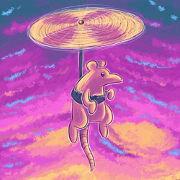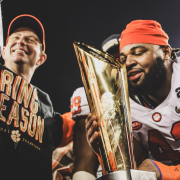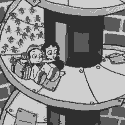|
duz posted:APIs are definitions on how to interact with software. By definition you have to copy it, otherwise you can't interact with the program. Making APIs copyrightable means that now every single Windows program written by non-Microsoft companies now infringe on Microsoft's copyrights. Unless of course they got permission from Microsoft, which I'm sure they'll never reject anyone for spurious reasons. Or to put it in terms a goon would care about, every single game on Steam would violate Valve's copyrights. Not sure this follows, since most games likely use Microsoft's haders under license. What this would make illegal, however, would be some ports of games for Mac OS: some were made using Wine, which is an independent reimplementation of Microsoft's APIs. And don't give me the "fair use" bit: that's not good enough for someone to sell products, and some of the claims would be tough, since the work is of commercial nature, and it does make it harder for MS to make money, but lowering value of their product vs. competitor's. (As being able to get software on OS X reduces reasons to own a copy of Windows).
|
|
|
|

|
| # ? May 9, 2024 07:54 |
|
duz posted:APIs are definitions on how to interact with software. By definition you have to copy it, otherwise you can't interact with the program. Making APIs copyrightable means that now every single Windows program written by non-Microsoft companies now infringe on Microsoft's copyrights. Unless of course they got permission from Microsoft, which I'm sure they'll never reject anyone for spurious reasons. Or to put it in terms a goon would care about, every single game on Steam would violate Valve's copyrights. You can copy an API without copying the code that defines it. The decision is based on the (possibly inaccurate) assumed fact that Google copied the code directly.
|
|
|
|
I mostly understand what an API is, but wouldn't ruling that APIs weren't protected mean that Google could whole cloth copy say the cocoa api from apple and start running OSX apps on chromeOS or iPhone apps on android? Because that's what it seems like they did with Java. Now they did rewrite and reimplement a ton of stuff. I'd say that is fair game, but they didn't do that with everything and that's the problem.
|
|
|
|
computer parts posted:I thought the point of contention was what "persons" counted as. Nope - at least, not for the purposes of the 14th Amendment, where it's well settled that in the Constitution, person means human regardless of citizenship or voting status. A state has 10 representatives, so it must draw 10 districts. Before the 1 person, 1 vote rule, those districts could be 9 districts of one family each, and one district of 'everyone else'. The Supreme Court ruled that was bullshit: the districts had to have equal numbers of people. That's what's at stake: if 'equal numbers of people' means equal numbers of humans, equal numbers of citizens, or equal numbers of citizens legally eligible to vote for the purposes of saying the districts are roughly equal. It would not change how many representatives each state got - merely how they draw their districts for that number. While some of those are more advantageous for Democrats than others I can't say that any is wrong in principle - they all make perfect sense from certain perspectives (each representative represents the same number of people/citizens/voters). Where it starts getting iffy is the sudden need to constitutionality that choice: as all are reasonably valid it's something that should probably be left to the states, not mandated by the Supreme Court.
|
|
|
|
Mr. Nice! posted:I mostly understand what an API is, but wouldn't ruling that APIs weren't protected mean that Google could whole cloth copy say the cocoa api from apple and start running OSX apps on chromeOS or iPhone apps on android? This is actually true. Google did copy some code. Here, let me show you the entirety of the copied code: code:Ruling that APIs weren't protected would mean that Google could whole cloth copy the cocoa API from Apple, yes, but doing that wouldn't copy any functionality. And the functionality is the important part. APIs are mostly just lists of names of things the program can do, the functionality is the stuff that actually does those things.
|
|
|
|
Mr. Nice! posted:I mostly understand what an API is, but wouldn't ruling that APIs weren't protected mean that Google could whole cloth copy say the cocoa api from apple and start running OSX apps on chromeOS or iPhone apps on android? All of the backing code except one little sort function was newly written. The APIs were rewritten and have significantly worse documentation in the Google version . By necessity the libraries will have the same package names, class names and function definitions because that's what programs are looking for. Google cannot copy the cocoa API whole cloth by just cutting and pasting header files. All that shows is the plan for the program, they'd have to actually write the code. Microsoft has actually done this and will allow you to compile iOS apps for windows 10: http://arstechnica.com/information-technology/2015/04/microsoft-brings-android-ios-apps-to-windows-10/
|
|
|
|
Mr. Nice! posted:I mostly understand what an API is, but wouldn't ruling that APIs weren't protected mean that Google could whole cloth copy say the cocoa api from apple and start running OSX apps on chromeOS or iPhone apps on android?
|
|
|
|
Series DD Funding posted:Just as a single example, it likely would've been impossible for Firefox to correctly render designed-for-IE pages back when that was a thing without copying Microsoft's APIs. It's a massive change. As mentioned previously, PC games on the Mac made with Wine are a perfect example. Similarly, Linux could not have existed if APIs were copyrightable. SCO v. IBM was, at its core, a similar case to Oracle v. Google. Another somewhat-but-not-entirely-similar example (for technical reasons I don't want to get into): the only reason IBM doesn't own the PC market today is because it was legal to reverse engineer the IBM PC BIOS for interoperability reasons. This decision would not explicitly undo that (again, due to technical details) but it would effectively place that activity next on the chopping block. To put it into more practical terms, it would be like Apple suing Google if Google Now tried to make it easier to switch from the iPhone by getting the weather when you asked your Android phone "Siri, what's the weather?" ComradeCosmobot fucked around with this message at 15:31 on May 27, 2015 |
|
|
|
OddObserver posted:Not sure this follows, since most games likely use Microsoft's haders under license. What this would make illegal, however, would be some ports of games for Mac OS: some were made using Wine, which is an independent reimplementation of Microsoft's APIs. And don't give me the "fair use" bit: that's not good enough for someone to sell products, and some of the claims would be tough, since the work is of commercial nature, and it does make it harder for MS to make money, but lowering value of their product vs. competitor's. (As being able to get software on OS X reduces reasons to own a copy of Windows). Most, sure, but not all. It's entirely possible to write Windows compatible programs without ever getting a license from Microsoft. Making APIs copyrightable would make it that much harder for no advantage since the APIs have to be written anyways. Also, commercial use does not invalidate the fair use defense, that's simply one of the four factors and not the strongest one either.
|
|
|
|
It's been 2 weeks since I took the final for my copyright class but isn't "functionality" supposed to be an express exception to what's copyrightable? How is an API (APPLICATION PROGRAM INTERFACE) not a functional element? Are the individual text strings they used in implementing the API what's copyrighted here?
|
|
|
|
Deceptive Thinker posted:It's been 2 weeks since I took the final for my copyright class but isn't "functionality" supposed to be an express exception to what's copyrightable? That's pretty much Oracle's stance, yes. You can have a MIN() function, but you have to call it GET_MINIMUM() because the guy who first called it MIN() was exercising a modicum of creativity.
|
|
|
|
evilweasel posted:A state has 10 representatives, so it must draw 10 districts. constitution allows for multi-member districts
|
|
|
|
ComradeCosmobot posted:That's pretty much Oracle's stance, yes. You can have a MIN() function, but you have to call it GET_MINIMUM() because the guy who first called it MIN() was exercising a modicum of creativity. And of course this would mean that programs that are looking for MIN() wouldn't be able to compile against the different API with GET_MINIMUM() instead
|
|
|
|
Deceptive Thinker posted:It's been 2 weeks since I took the final for my copyright class but isn't "functionality" supposed to be an express exception to what's copyrightable? If I understood correctly (techie, not lawyer) Oracle claim the "structure, sequence and organization" is copyrightable --- e.g. that their min() operation is in the Math class in the java.lang package, and that the totality of all those grouping/functions is copyrightable.
|
|
|
|
OddObserver posted:If I understood correctly (techie, not lawyer) Oracle claim the "structure, sequence and organization" is copyrightable --- e.g. that their min() operation is in the Math class in the java.lang package, and that the totality of all those grouping/functions is copyrightable. Mostly correct - there's also the order in which declarations are made and how declarations are split across various files. That's what's copyrightable, and the decision at the circuit turned on the circuit's belief that Google engaged in literal copying of that aspect of the API.
|
|
|
|
Kalman posted:Mostly correct - there's also the order in which declarations are made and how declarations are split across various files. That's what's copyrightable, and the decision at the circuit turned on the circuit's belief that Google engaged in literal copying of that aspect of the API. For java, the split between files is mechanically equivalent to the organization of packages and classes (there is absolutely no human choice involved --- once package and class names are selected the file name is proscribed by the language rules ---- java.lang.Math is always java/lang/Math.java). The order within file can indeed freely vary by choice of whoever wrote it, though it's sort of a tree-in-woods situation: anyone using Java uses API docs which are ordered basically alphabetically (within categories based on the kind of thing the item is).
|
|
|
|
The Java suit is kind of weird and a hard one to figure out. I agree APIs shouldn't be copyrightable and they haven't been in the past. There are plenty of open source Java languages out their that haven't run into legal trouble. What gets lost in the headlines is the scummy poo poo Google did and some the dumb business practices from Sun that led to this mess. Sun was broke when Google was developing Android and was desperate to monetize Java and JVM (Java Virtual Machine) as it was by far their most successful product. Sun was licensing a Java subset called J2ME for mobile phones but it was really lovely and Google didn't want to use it. To prevent someone from just bring Java to phones for free Sun had a bunch of licensing rules in place for the Open Source implementations (such as Apache Harmony). Anyways, Google figured they could avoid the licensing issue by developing their own Virtual Machine called Dalvik and use the Java Language as the base language. This made essentially a wide fork of the language meaning Sun/Oracle were loosing their control of it. The scummy part on Google's part was to advertise this new language, which I'm not sure even has a name, as Java to developers. It worked well for them as they got a huge programmer base from the get go and was one of the main reasons it became the dominate mobile OS. In the end though this fork means Android is stuck in the Java 1.6 era and hasn't got any of the new features in Java 7 or 8. Also, didn't this pretty much happened already in the past with Java when Microsoft tried to hijack the language?
|
|
|
|
Visual J++ was originally made with agreement with Sun, but Microsoft changed things a bit and Sun sued for trademark infringement and contract violations. Microsoft settled and said "Fine, we'll make our own Java" and thus C# was born.
|
|
|
|
"APIs are copyrightable" is a drastic oversimplification of what the case said, which results in people misunderstanding it. People keep looking at software copyright as the right metaphor, but the courts are viewing it similarly to phone books and medical code indices.
|
|
|
|
Mr. Nice! posted:I'm not sure I understand google's claim or the open source handwringing about APIs being copywritable. Google basically rewrote a chunk of Java, but they also flat out copied portions of the Java api without licensing it and then sold it commercially. By preventing that, I don't think the roof is going to fall. Also the article you linked is written by the brother of a google exec and is certainly biased. It would possibly be the dumbest decision the court has made since Citizens United. APIs almost always copy from each other. If I want to grab the first 5 characters of a string I can do the following code:What exactly is the API, is "substring" an 'API' for shortening a string, or is it just a function? How many functions does it take to make an API? If the decision stands there will be thousands of lawsuits about poo poo like that. We will have Judges who may not even know what a line of code is being placed in a position to make those calls. It will be the software Patent Wars all over again. Everyone is going to go for copyrights on every thing and sue the poo poo out of everyone. As usual only the Lawyers will win. Xae fucked around with this message at 00:34 on May 28, 2015 |
|
|
|
Xae posted:It would possibly be the dumbest decision the court has made since Citizens United. That's not what Oracle is saying is copyrighted though. They say that substring being in Java.lang.string is copyrighted. Except for anyone to reimplement Java it has to be there
|
|
|
|
hobbesmaster posted:That's not what Oracle is saying is copyrighted though. They say that substring being in Java.lang.string is copyrighted. Except for anyone to reimplement Java it has to be there They are claiming the "Structure, Sequence and Organization" of the API is copyrighted. The Definition of the components of the API would be the Structure. The placement would be the Organization.
|
|
|
|
Hot Dog Day #91 posted:Read all three opinions. Found myself actually agreeing with the principal dissent in the bankruptcy case. Consent can't cure constitutional violations, but this wasn't a violation anyway. I was going to disagree with you, because Sotomayor is my girl, but then I gave it a moment's thought and yeah CJ Roberts got it right. edit: at least, Roberts got it right on the separation of powers issue. I don't think that a court of last resort is required, or even necessarily should, decide cases on the most narrow grounds as Roberts initially argued. A court of last resort operates to give guidance to all the lower courts; that is their main job, and then their lower court minions will deal with the various factual scenarios in which those legal principles apply. Opting to go for the narrowest dispositive issue can be - and I would say many times is - counter-intuitive to that role. Green Crayons fucked around with this message at 01:28 on May 28, 2015 |
|
|
|
hobbesmaster posted:That's not what Oracle is saying is copyrighted though. They say that substring being in Java.lang.string is copyrighted. Except for anyone to reimplement Java it has to be there At some point someone at Oracle had to stop and think "hey if we win this case and Google decides 'fine gently caress you we'll make our own language couldn't that come back to haunt us and make less people use our stuff?"
|
|
|
|
Evil Fluffy posted:At some point someone at Oracle had to stop and think "hey if we win this case and Google decides 'fine gently caress you we'll make our own language couldn't that come back to haunt us and make less people use our stuff?" That's a next quarter problem. Does this look like next quarter to you??
|
|
|
|
Evil Fluffy posted:At some point someone at Oracle had to stop and think "hey if we win this case and Google decides 'fine gently caress you we'll make our own language couldn't that come back to haunt us and make less people use our stuff?" Yeah it kinda makes Oracle look desperate, but Ellison could just be really vindictive. A definitive ruling in this area could easily do Oracle as much harm as good though less so than for other tech companies.
|
|
|
|
Xae posted:They are claiming the "Structure, Sequence and Organization" of the API is copyrighted. I thought it was the structure, sequence and organization in its entirety. Is the controlling law the area still Whelan and Computer Associates? Those are separate circuits - could the court just want to settle what exactly structure, sequence and organization means and protects?
|
|
|
|
Evil Fluffy posted:At some point someone at Oracle had to stop and think "hey if we win this case and Google decides 'fine gently caress you we'll make our own language couldn't that come back to haunt us and make less people use our stuff?" At this point it's probably cheaper to just accept whatever licensing scheme Oracle wants.
|
|
|
|
computer parts posted:At this point it's probably cheaper to just accept whatever licensing scheme Oracle wants. True, but Google is big enough that it can make very expensive decisions if they decide that it's the right strategy for their future.
|
|
|
|
computer parts posted:At this point it's probably cheaper to just accept whatever licensing scheme Oracle wants. Microsoft has been through this dance once, a language better than Java was the result.
|
|
|
|
hobbesmaster posted:Microsoft has been through this dance once, a language better than Java was the result. Yeah but Microsoft doesn't have ADD and can stay focused on one thing for more than week.
|
|
|
|
hobbesmaster posted:Microsoft has been through this dance once, a language better than Java was the result. Seriously. At this point C# is rapidly becoming the One True Language on the Only Platform That Matters as far as consumer software is concerned, and there's way better options for enterprise and systems software. Java continues to exist mostly for maintainers of existing software that was made on Java back when they were still pretending that you could actually write platform-independent code in Java (if you actually want to do anything more complex than a command line application, you can't).
|
|
|
|
LeftistMuslimObama posted:Seriously. At this point C# is rapidly becoming the One True Language on the Only Platform That Matters as far as consumer software is concerned, and there's way better options for enterprise and systems software. Java continues to exist mostly for maintainers of existing software that was made on Java back when they were still pretending that you could actually write platform-independent code in Java (if you actually want to do anything more complex than a command line application, you can't). Well. That and it's what Android runs on at its core. That's why Oracle cares.
|
|
|
|
IIRC this suit started before Java was open source. Oracle's requirements for implementing Java is that you have to pass the entire test suite. Besides this not really being possible since Swing doesn't work on mobile platforms, the test suite's license agreement downright prohibited use for mobile devices, meaning Google couldn't implement it even if they were willing to implement it properly. After the OpenJDK became a thing, the other option was to source a majority of your code from the OpenJDK, in which case you could use the test suite for any system. Google, of course, downright refused to do that as well. So, this is a mix of Oracle and Google being stubborn, which may play into SCOTUS seeing this case as a waste of time. Reading the opinion, I would tend to agree that an API should have some level of protection, and in this case, I would even side with Oracle for the fair use argument. For things like POSIX, I would argue that it's fair use to copy the APIs, since the whole point is to have some standard interface for programs to use. Enforcing copyright would defeat the purpose. In Google's case, they're not copying the API to be able to run Java programs; they're copying it because it was convenient, and programmers who already knew Java would be more familiar with their own proprietary system that isn't quite Java. They could have copied the Java language only and the parts of the API that it requires (i.e. java.lang and subpackages), but they chose to copy far more than that instead of using their own structure.
|
|
|
|
Hasters posted:Yeah but Microsoft doesn't have ADD and can stay focused on one thing for more than week. Yup, with increased attention span they can screw up new technology faster than ever before! 
|
|
|
|
lamentable dustman posted:The Java suit is kind of weird and a hard one to figure out. I agree APIs shouldn't be copyrightable and they haven't been in the past. There are plenty of open source Java languages out their that haven't run into legal trouble. What gets lost in the headlines is the scummy poo poo Google did and some the dumb business practices from Sun that led to this mess. I kinda disagree that apis shouldn't be copyrightable (at least the structure, organization, etc. as others have said). The structure, design, etc seem to pass the originality bar for copyright since there's actual thought and effort put into the structuring of an api (and in java's case, the inheritance relationship between classes). Further, I can't really think of a proper use of apis that wouldn't be protected under fair-use. That being said, google's wouldn't because they copied only enough of the apis to be able to allow dalvik to benefit from preexisting java programmers and libraries without really allowing the inverse to be true. And yeah, the java fork that is android pisses me off because it basically keeps java 1.6 alive and kicking, and holds jvm language writers back because when they try to target later versions of java's bytecode, android users scream bloody murder because it means they'll have to use their platform's outdated language.
|
|
|
|
hobbesmaster posted:Microsoft has been through this dance once, a language better than Java was the result. Microsoft didn't build Windows on Java though.
|
|
|
|
Condiv posted:I kinda disagree that apis shouldn't be copyrightable (at least the structure, organization, etc. as others have said). The structure, design, etc seem to pass the originality bar for copyright since there's actual thought and effort put into the structuring of an api (and in java's case, the inheritance relationship between classes). Further, I can't really think of a proper use of apis that wouldn't be protected under fair-use. That being said, google's wouldn't because they copied only enough of the apis to be able to allow dalvik to benefit from preexisting java programmers and libraries without really allowing the inverse to be true. Issue is that fair use is such a nebulous right that short of a Supreme Court decision stating unambiguiously that something is fair use, no ifs, ands, or buts, then it's just too expensive to risk. IP litigation is expensive and often times in the more ambiguious fair use cases companies can't afford to litigate it and risk the chance of it going against them. If there was a way to get a decision on fair use protection ahead of time rather than raising it as a defense to infringement, it would be a lot more useful, but given the costs of litigation a lot of stuff that fair use theoretically allows can't be done in practice.
|
|
|
|
evilweasel posted:Issue is that fair use is such a nebulous right that short of a Supreme Court decision stating unambiguiously that something is fair use, no ifs, ands, or buts, then it's just too expensive to risk. IP litigation is expensive and often times in the more ambiguious fair use cases companies can't afford to litigate it and risk the chance of it going against them. If there was a way to get a decision on fair use protection ahead of time rather than raising it as a defense to infringement, it would be a lot more useful, but given the costs of litigation a lot of stuff that fair use theoretically allows can't be done in practice. That's a more general issue with the entire IP system, which is ridiculously outdated and held together with gum and prayers at this point.
|
|
|
|

|
| # ? May 9, 2024 07:54 |
|
dpbjinc posted:That's a more general issue with the entire IP system, which is ridiculously outdated and held together with gum and prayers at this point. Cost is not really IP specific, being more of an issue with discovery, and only fair use is quite that nebulous. That said, it's not actually that hard to predict the outcome of most IP cases in advance with pretty good success rates. "The IP system is outdated" is a stupid opinion that's completely ignorant of historical context, though.
|
|
|


































